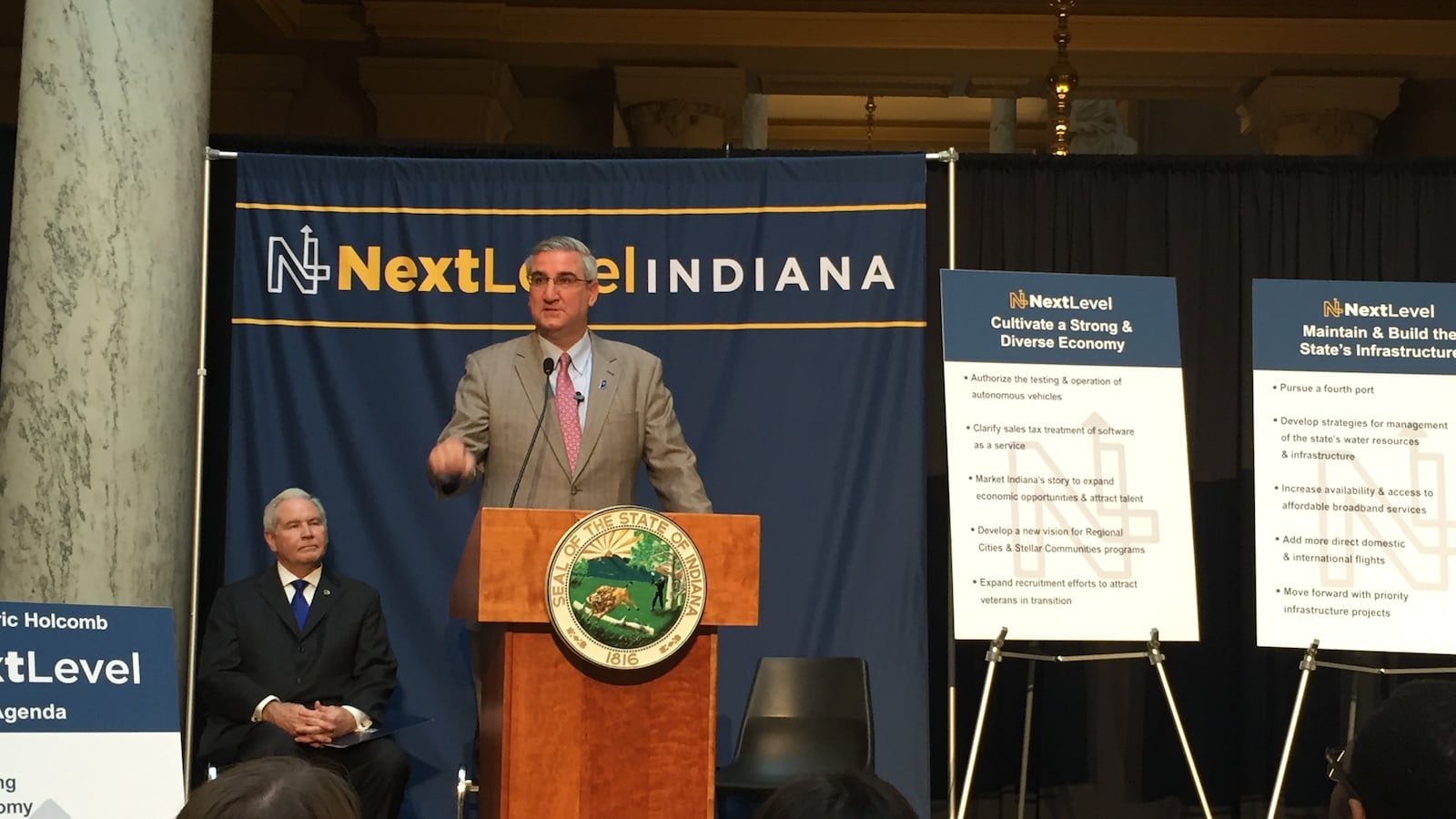If Gov. Eric Holcomb’s legislative priorities are any indication, next year won’t be the kind of education legislative session Hoosiers might be used to, with testing and school choice possibly taking a back seat to college and career prep.
Holcomb announced his 2018 legislative agenda Wednesday morning. His goals focus primarily on workforce issues, with K-12 education as one piece of that system. Overall, Holcomb’s education initiatives stem from a desire to better integrate what schools are teaching students with what employers are looking for when they hire.
“This year we’re going to be focused on our people,” Holcomb said during today’s press conference unveiling his plans. “We’re going to have to make sure our workforce is skilled up.”
Nationally, Republicans and Democrats have increasingly carved out space in their education policy plans for workforce and post-high school efforts. President Donald Trump has spoken publicly about the need for vocational training, and New York City Mayor Bill de Blasio set a goal to increase the number of students graduating from city colleges with technical degrees.
But while this view isn’t new to Indiana — Pence got the ball rolling with a state Career Council and more funding for career and technical education — it’s a departure from the heavy K-12 schools focus Pence displayed during much of his administration.
When Vice President Mike Pence was Indiana’s chief executive, education was front and center — from charter schools and private school vouchers to battles over the state superintendent’s role and leaving Common Core. Although Holcomb had a fairly successful year when it came to last year’s education goals around preschool and making the state superintendent an appointed position, he has been far less focused on education policy Indiana Republicans have typically championed — particularly the areas of school choice, testing and accountability — than his predecessor.
Holcomb’s 2018 agenda includes:
- Creating an “Education to Career Pathway Cabinet” to centralize education initiatives among the department of education, commission for higher education and department of workforce development.
- Requiring every Indiana school to offer at least one computer science class by 2021, as well as training for teachers in computer science.
- Creating the Office of Apprenticeship and Work-Based Learning to increase opportunities for high school students and adults.
- Broadening teacher licensure requirements for people interested in teaching career and technical education classes.
The cabinet would oversee plans that come out of local and regional groups — replacing the state’s former regional work councils — that are centered around things like job training, career and technical education partnerships or possibly even graduation pathways. The local groups would potentially have some measure of control over a portion of education funding dedicated to career and technical education. Right now, those dollars flow from the state to school general funds.
State Superintendent Jennifer McCormick would be on the pathways cabinet. She has yet to release her own legislative agenda for the coming session, but her response to today’s announcement was positive overall.
“We are happy to be a part of Governor Holcomb’s education efforts,” McCormick said in a statement. “Any efforts that promise to bring more success to students are something we will stand behind.”
That’s pretty much where Holcomb’s education agenda ends. But it doesn’t mean Indiana won’t soon face some major education decisions.
When lawmakers start their work early next year, they’ll likely have to deal with the state’s diploma crisis. Because of new federal law, Indiana’s general diploma — a less rigorous alternative to the default Core 40 diploma that about 12 percent of Indiana students earn — will cease to count in the graduation rate Indiana must report for federal accountability.
That means many schools could see their graduation rates plummet, and the students who earn the general diploma (typically students who struggle academically or those with special needs) won’t be counted as graduates to the federal government, a concern for parents and special education advocates who have been looking for more ways to include students in the mainstream education system.
Indiana is also in the process of planning for that new federal law, known as the Every Student Succeeds Act. There have already been a few major hiccups, most notably the diploma issue, the state’s plan to offer separate state and federal A-F grades next year (partially a response to the graduation rate issue) and a recently announced proposal to give high schoolers the SAT or ACT in place of end-of-course exams. All of these issues will need to be handled to some extent by McCormick or the Indiana State Board of Education, but lawmakers would probably also need to be involved.
On top of all that, Indiana educators are also getting close to a 2022 deadline that requires them to have more advanced degrees in order to teach the popular dual credit classes that give high schoolers college credit. Many are worried that the rule change would disqualify a significant number of current dual credit teachers. Educators have repeatedly appealed to lawmakers for funding to help teachers get the education they need, but no major steps have been taken.
Indiana’s two top Republican leaders, Senate President David Long and House Speaker Brian Bosma were supportive of Holcomb’s workforce focus and “bold,” “aggressive” agenda, an early indication that he might see support from key lawmakers.

